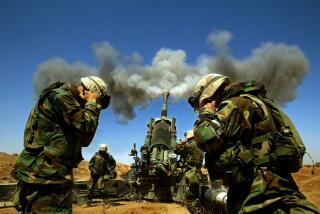Bush Likely to Veto Bill on Gas, Biological Arms
- Share via
WASHINGTON — President Bush is likely to veto legislation this week that would impose stiff penalties on countries or companies that assist in the development of chemical and biological weapons, White House officials said Thursday.
The sensitive legislation has been the subject of a long fight within the government that has put Bush in a difficult position. As vice president, he took the lead in proposing global limits on chemical weapons, and as President, he has continued to press that campaign.
At the heart of the debate is the legislation’s use of mandatory sanctions against countries that produce, acquire or use chemical weapons.
At the White House and State Department, the sanction provisions were seen as “an invasion of the President’s prerogatives” and congressional “micromanagement” of the Adminstration’s conduct of foreign policy, a White House official said.
“The downside is, you don’t want to appear to be soft on chemical weapons when you’re opposing (Iraqi President) Saddam Hussein,” the official said. Despite that potential peril, he added, “strong indications are (that) it’s going to be vetoed.”
At the Pentagon, officials argued that a veto, coming just as Bush is about to begin a trip in which he will visit U.S. forces in Saudi Arabia on Thanksgiving Day, would demoralize troops already made fearful by Iraq’s chemical and biological weapons arsenal.
The Pentagon agreed that the mandatory sanctions are undesirable, “but it could be worse,” a Pentagon official said. “The bill isn’t perfect, but it is probably as good as you’re going to get right now and, if it is vetoed, Congress could come back with worse.”
“We damned it with faint praise, and the State Department was actively against it,” he added.
California Rep. Mel Levine (D-Santa Monica), one of the proponents of the measure, said the veto would be “a triumph of obstinate ideology over morality and American interests.
“It will send a signal that chemical weapons use won’t be punished,” Levine said in a statement issued by his office. “A veto would undermine the President’s own policy.”
The chemical weapons sanctions are contained in a renewal of the Export Administration Act, which would ease controls on exports to Eastern Europe and the Soviet Union.
Bush has until Saturday to sign or veto the bill--or, as is likely in this case, let it die because he has not signed it when Congress is not in session, a so-called pocket veto.
Bush, more than any recent President, has sought to put a public focus on the issue of chemical weapons. He made the issue a central element in his first presidential speech to the United Nations in 1989.
Staff writer Melissa Healy contributed to this report.
More to Read
Get the L.A. Times Politics newsletter
Deeply reported insights into legislation, politics and policy from Sacramento, Washington and beyond. In your inbox twice per week.
You may occasionally receive promotional content from the Los Angeles Times.








